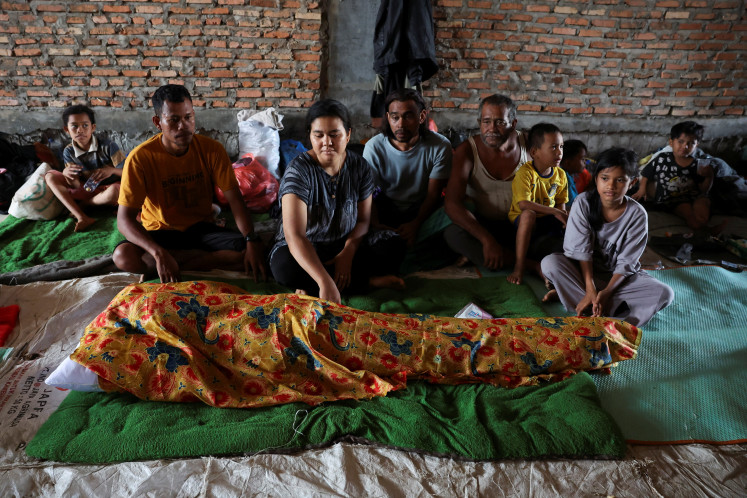Popular Reads
Top Results
Can't find what you're looking for?
View all search resultsPopular Reads
Top Results
Can't find what you're looking for?
View all search resultsBusiness and human rights principles should be aligned: HRWG
President Joko "Jokowi" Widodo greets members of NGOs and human rights activists at an event to mark International Human Rights Day at the State Palace on Dec
Change text size
Gift Premium Articles
to Anyone
P
span class="caption">President Joko "Jokowi" Widodo greets members of NGOs and human rights activists at an event to mark International Human Rights Day at the State Palace on Dec. 11. (Antara/Yudhi Mahatma)
The Human Rights Working Group (HRWG) has called on President Joko "Jokowi" Widodo to uphold human rights and democratic values in line with economic growth, stressing that development should be carried out with respect for human rights.
HRWG executive director Rafendi Djamin said the government's economic-oriented goals in 2015 had neglected its commitment to upholding human rights, while ideally business and human rights principles should be aligned because they had similar objectives, namely to improve welfare of the people.
"The government needs to be consistent in upholding human rights ahead of boosting economic growth with projects that involve Indonesians," Rafendi told thejakartapost.com.
Rafendi said that Jokowi's administration had failed to include human rights principles in its domestic policies that aimed to boost economic and investment growth.
However, HRWG's program manager for the United Nations and Organization of Islamic Cooperation, Muhammad Hafiz, said in contrast to domestic policy, Indonesia had played a significant role in promoting human rights at the global level through the UN in 2015.
Hafiz said that at the foreign policy level, Indonesia had demonstrated the country's commitment to upholding democratic values by endorsing a number of UN resolutions related to human rights.
For example, Indonesia pushed for Resolution A/HRC/28/L.4 on combating intolerance and discrimination based on religion or belief to be adopted by the UN Human Rights Council (UNHRC) during its 28th session and contributed to the drafting of Resolution A/HRC/RES/23/9 on the negative impact of corruption on the enjoyment of human rights, which was adopted at the UNHRC's 23rd session, both in 2015.
"Indonesia's foreign policy in the UN is not in line with its domestic policy. Indonesia pushes other countries to be tolerant and to promote anticorruption efforts, but it's not the same at the domestic level," Hafiz said.
According to Hafiz, the government should translate its foreign policy at the domestic level by integrating human rights principles into policies that were made to propel business growth, particularly in investment.
Hafiz said the central government needed to ensure that companies investing in Indonesia respected human rights principles and insist that it be stated in the working contract between companies and their workers.
He also stressed the need for the central government to help local governments that mostly lacked the ability to adopt human rights principles into their policies.
Rafendi said human rights violations would keep happening as long as the government did not align business and human rights principles. (bbn)










